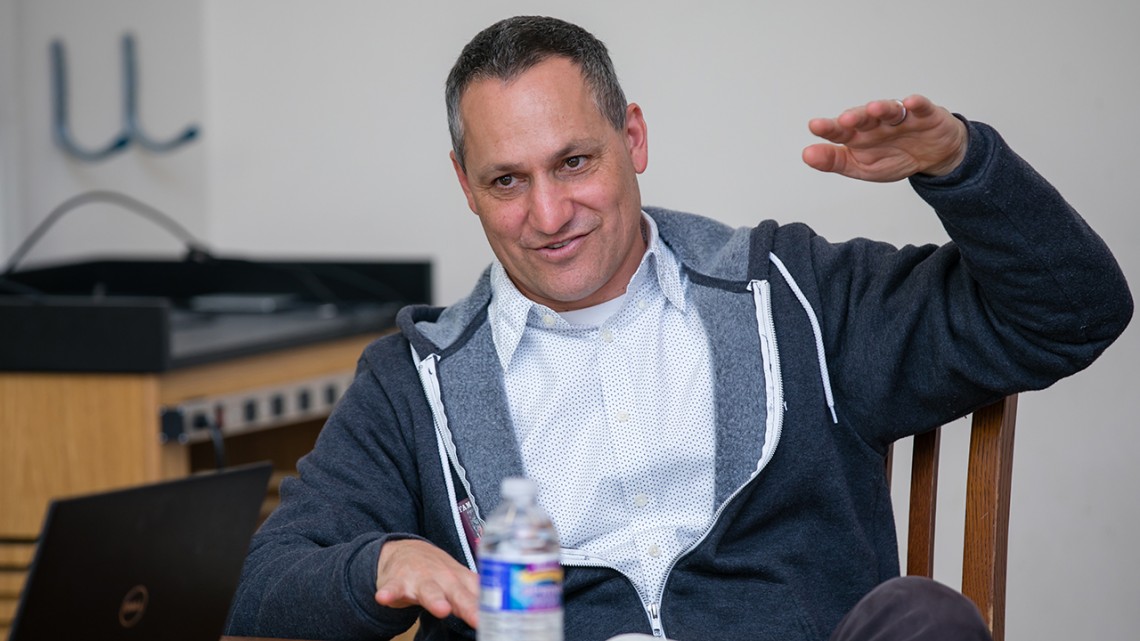
Cristos Goodrow ’91, YouTube’s vice president of engineering, speaks to students during a Career Conversation event Oct. 19 sponsored by the College of Arts and Sciences Career Development Center.
Alumnus guides YouTube’s search process
By Kathy Hovis
Some days, there’s nothing better than slouching on the couch and watching a stream of YouTube videos – whether you’re catching up on “Saturday Night Live” skits, laughing with Dude Perfect, learning the latest makeup techniques from James Charles or chilling with cute puppy videos.
But finding the videos you love in a sea of content would be impossible without the site’s search and discovery systems, which are headed by Cristos Goodrow ’91, YouTube’s vice president of engineering. Goodrow leads the team that helps viewers sort through the millions of videos uploaded every day to find content they want to see. Goodrow visited campus Oct. 19 for a Career Conversation with students sponsored by the College of Arts and Sciences Career Development Center.
“With 400 hours of video being uploaded every minute, if you were to randomly look through videos, you’d have no chance of finding what you want to watch,” Goodrow said. “And even if we created lists of titles that people find interesting, that wouldn’t work either, because people’s tastes are so fragmented.”
Therefore, the machine learning techniques YouTube uses to come up with your recommendations and to refine their search features are constantly changing and improving, said Goodrow, who majored in math and computer science in the College of Arts and Sciences. He went on to receive a master’s degree in mathematics from the University of California, Santa Barbara and did doctoral work at UC Berkeley.
Goodrow didn’t apply to Cornell to study math – he wanted to be an architect. “But I couldn’t draw,” he said. So, he got some advice from Cornell admissions staff to try applying to the College of Arts and Sciences instead.
At Cornell, although his best subjects were history and English, “for some reason, I kept taking math classes,” he said. “In my second semester as a freshman, I had never been through a winter – since I’m from Los Angeles – so I got bronchitis and a D in math. I was so surprised that I could do so poorly, and so fascinated, that I wanted to major in math.”
So, major in math he did, and since that major required a few computer science classes, he took those, too, finding them easier than his math classes and ultimately ending up with a computer science major as well.
As a student, Goodrow helped start Cornell’s Alternative Spring Break program, which still exists today and offers students the chance to go on service learning trips rather than typical spring break beach trips.
After graduation, he worked for Teach for America, then at a tech company. From that position, he made his way through startup companies that were acquired by PeopleSoft and IBM. Before joining YouTube, he was a director at Google Shopping and director of search engine software at Amazon.
Goodrow said his computer science background helps him understand computer processes and the limits of their abilities. His liberal arts training – which helped him develop clear communication skills and the ability to analyze lots of information – is vital when he works with his team and manages projects.
Throughout his career, Goodrow said he has gravitated toward jobs that will allow him to learn new skills and be challenged.
“I was a little concerned that YouTube was too avant-garde for me,” he said. “I’m just a mathematician by training, and not drawn to being at the cultural center of the universe.”
But the lure of trying something new was strong.
The world of machine learning has undergone massive change in the last five years, Goodrow said, as programmers moved from using regression formulas to using deep neural network technology, which takes advantage of the speed of today’s computers to train them on trillions of observations in short time periods.
“What it comes down to now is data, and having a lot of it is very important,” he said. “It turns out that what you want to watch more is determined by what you’ve already watched the most.”
Media Contact
Get Cornell news delivered right to your inbox.
Subscribe

